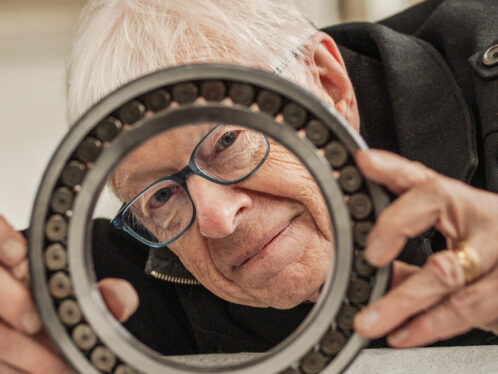
Alice Bah Kuhnke – Portrait of an involved life
Sektor3’s Alice Bah Kuhnke believes that voluntary organizations must be better at promoting themselves and show the impact that their work has on our daily lives.
Summary
AGE: 37
LIVES: In Nacka, southeast of Stockholm.
FAMILY: Husband and two daughters.
HOBBIES: “I spend as much of my non-working time as possible with my children.”
FAVOURITE MOVIE: “I prefer some escapism such as romantic comedies starring Will Smith.”
LATEST BOOK: Barack Obama’s Dreams from My Father.
PEOPLE SHE ADMIREs: Those who are brave enough to follow their own convictions.
Sektor3’s Alice Bah Kuhnke believes that voluntary organizations must be better at promoting themselves and show the impact that their work has on our daily lives.
Alice Bah Kuhnke, head of the new Swedish think tank Sektor3, is a familiar face to most Swedes. At the age of 19 she became a presenter for Disney Time. That was the start of 10 years in television as a presenter and investigating journalist. Since she left television she has, among other things, been head of the department “Ideas for Life” at Swedish savings company Skandia. In 2004, she took on the job as secretary-general for the Fair Trade organization, where she remained until the new think tank started in November 2008. All through her career she has made herself known as a person who makes her voice heard.
“I have always lived a life where people around me knew who I was, even if they didn’t know me,” Kuhnke says. The main reason was that in Horda, the small town in southern Sweden where Kuhnke grew up, she was the only one with a father from Gambia and the only one with dark skin.
“Maybe that’s why I’ve never been afraid to stand in the spotlight,” she adds with a laugh.
In addition, village life in Horda made her a joiner. The village was situated in the middle of the Swedish Bible Belt and had three different and very active Christian free churches as well as societies that centred around handicrafts, scouting and sports.
“Growing up, it was natural for us to be involved in all kinds of activities, and that has made a great impact on who I am,” says Kuhnke.
Now, as head of the Sektor3 think tank, Kuhnke represents its 30 member organizations, which range from cultural to social, cooperative and religious.
As a way to explainher role, Kuhnke talks about the sector in Swedish society that comprises civil groups. The diversity within this sector is huge, as its constituents are defined only by optional participation in an activity run by members that share a common value or interest. This can range from a kids’ football tournament or a local dramatic society to cooperative businesses and religious congregations and even supermarket loyalty programmes.
Sweden, which has a population of just 9 million, boasts 32 million members in 160,000 organizations, which means that more or less everyone belongs to something.
“We are one of the countries in the world with the most memberships, but I don’t think people realize how important this is,” says Kuhnke.
In a Sektor3 questionnaire top political civil servants were asked about their views on civil society.
“Everyone agreedthat a lot of good and important work was being done, but no one had a political strategy involving the civil society,” Kuhnke says. In her view this confirms the need to create debate and awareness for the work done.
Kuhnke predicts that the importance of the civil sector will continue to grow, given the way society is changing. The welfare system won’t be enough to guarantee good schools or health care for everyone.
“We have reached a situation where voluntary work has to be viewed with fresh eyes, both by the organizations themselves and by the rest of society,” says Kuhnke.
Through research and debate Sektor3 wants to help the people involved in civil activities to face the future and find the ability to get through the social changes regardless of whether the cause is the current financial crisis or environmental issues such as climate change.
“Civil society has to be scrutinized, to make it possible to enhance the positive and point out the nega-tive,” Kuhnke says. “We need to separate the wheat from the chaff. Even if many things in civil society are good, everything isn’t.”
This critical approachstarts from inside the organizations themselves, Kuhnke says. Through seminars, workshops and lectures arranged by Sektor3, member organizations will be able to provoke debate both inside and beyond their own organizations.
Most Swedish civil groups benefit from state funding, says Kuhnke, but this funding is likely to disappear, and other sources will need to be developed. Companies can play an important role here. In several countries, contributions to charity have been encouraged by giving companies tax breaks for such donations. Suggestions have been made that Sweden should follow suit.
“But when Parliament ordered a study, it only looked at what impact the tax reductions would have on the state budget,” says Kuhnke. “There are hundreds more questions that are relevant.” These include: How would this affect civil society? Who would benefit from this? What impact would this have on democracy?
The first research instigated by Sektor3 was a comparative survey of eight countries that allow reduced taxes for corporate donations to charity. The results from the Sektor3 survey were presented at the trad-itional, annual, political summer assembly held in Almedalen on the Swedish east coast island of Gotland.
Since this interview, Alice Bah Kuhnke has been recruited as vice-president, sustainability and CSR, at Sweden’s ÅF Group, a technical consulting company with some 4,000 employees. She took up this position on 1 September 2009.




